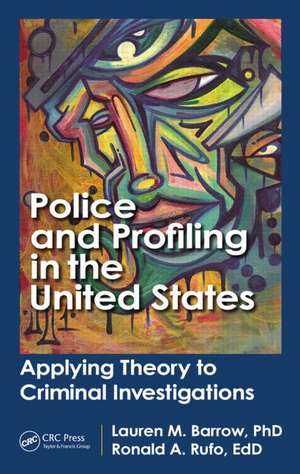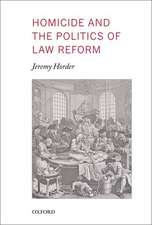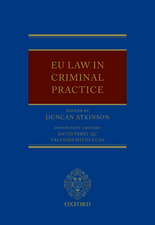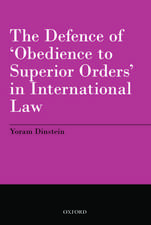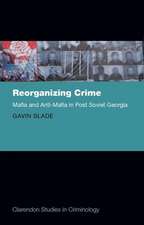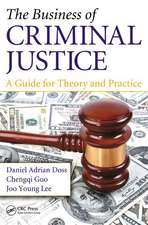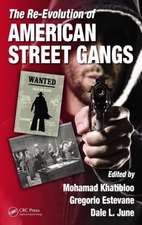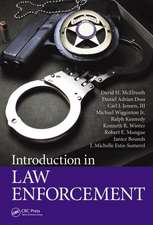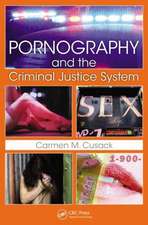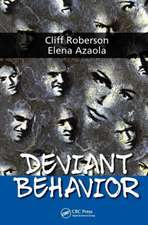Police and Profiling in the United States: Applying Theory to Criminal Investigations
Autor Lauren M. Barrow, Ron A. Rufo, Saul Arambulaen Limba Engleză Hardback – 15 iul 2013
Topics include:
- Classical and determinist views on criminal behavior and social theories on crime
- Inductive and deductive logic and the dangers of fallacies in logical reasoning
- Childhood deviant behaviors and research on the historical search for an explanation of criminal behavior
- Developing typologies based on different criminal characteristics
- Sexually based offenses, serial and rage killings, and hero complex killers
- The critical role of crime scenes in investigations and the Locard exchange principle
- The value of geographic profiling in solving crimes and modern approaches such as COMPSTAT
- Balancing the role of victims in crime solving with concern for their well-being
Preț: 766.84 lei
Preț vechi: 1104.31 lei
-31% Nou
Puncte Express: 1150
Preț estimativ în valută:
146.73€ • 153.61$ • 121.41£
146.73€ • 153.61$ • 121.41£
Carte tipărită la comandă
Livrare economică 07-21 aprilie
Preluare comenzi: 021 569.72.76
Specificații
ISBN-13: 9781466504356
ISBN-10: 1466504358
Pagini: 232
Ilustrații: 5 b/w images and 4 tables
Dimensiuni: 156 x 234 x 23 mm
Greutate: 0.6 kg
Ediția:New.
Editura: Taylor & Francis
Colecția Routledge
Locul publicării:Oxford, United Kingdom
ISBN-10: 1466504358
Pagini: 232
Ilustrații: 5 b/w images and 4 tables
Dimensiuni: 156 x 234 x 23 mm
Greutate: 0.6 kg
Ediția:New.
Editura: Taylor & Francis
Colecția Routledge
Locul publicării:Oxford, United Kingdom
Public țintă
Academics and professionals in criminal justice and law enforcement and criminal psychologists.Cuprins
Introduction. Disciplinary Contributions to Criminal Profiling. Leaders in Criminal Profiling. Theoretical Foundations. Historical Evolution. Classicalism. Neoclassicalism. Positivism. Determinism. Criminological Theory. Logic and Reasoning Practices. Fallacies. Deductive and Inductive Logic. Logic in Criminal Justice. Childhood Indicators. Historical Factors. Theory. Psychological Determinants. Sociological Determinants. Motives and Criminal Typologies. Motive. Motive Perspectives. Triggers. Intent. Criminal Typologies. Sociological Factors. Crime Scene Characteristics. Sexually Based Offenses and Motivated Crimes. Child and Sexual Abuse and Its Effects. Sexual Violence. Cycle of Violence or Abuse. Sexual Perversion. Cyber-Crimes and the Internet. Sexual Addiction. Sexually Violent Person. Voyeurism (Peeping Toms). Stalking. Love Stalker. Serial and Rage Killers. Types of Murder. Basic Demographic Profile. Past Profile. Types. Motivations. Causality. Hero Complex Killers. Primary Care Providers. Public Service. Crime Scene Indicators and Investigations. Crime Scene. First Officer on the Scene (Preliminary Investigator). Assessment of the Scene. Collection of Data. Chain of Custody. Locard Principle and Trace Evidence. CSA vs. CST vs. CSP? Geographic Profiling. Geographic Profiling. Distance Decay Theory. Bayesian Method of Estimation. Predictive Policing. CGT, GIS, COMPSTAT, CEWS, Blue CRUSH, and MAPS. Rational Choice Theory in the 21st Century. Social Disorganization Theory. Environmental Criminology. Broken Windows Theory. Victim Selection Characteristics. Lifestyle Theory. Routine Activities Theory. Conclusion. Research Methodology. Crime Scene-Based Approaches. Psychology-Based Approaches. Appendix: Profiles of Notorious Serial Killers.
Recenzii
"… empowers investigators to trust their ‘gut feelings’ by providing them with the theoretical knowledge and empirical evidence necessary to merge practical experience with statistically sound practices developing in the field. The profiles are amazing."
—SirReada Lot.org
—SirReada Lot.org
Notă biografică
Lauren M. Barrow, Ph.D., is an assistant professor of criminal justice at Chestnut Hill College. Dr. Barrow teaches a wide range of criminal justice courses—including drug abuse, organizational behavior, criminal ethics, criminology, victimology, juvenile justice, and homeland security. She was a founding member of the New Jersey Alliance for Crime Victims with Developmental Disabilities. Dr. Barrow has conducted innovative research in the deaf community pertaining to its risk of victimization and authored a book entitled Criminal Victimization of the Deaf. She has instructed undergraduate and graduate students, both in class and online, for over ten years.
Ron Rufo, Ph.D., is an adjunct professor at Kaplan University and also teaches at the City Colleges of Chicago. He has been a Chicago police officer for the past 18 years and has spent most of his career as a crime prevention speaker in the Preventive Programs Unit where he has given hundreds of presentations on profiling offenders, crime investigation, and street safety. Dr. Rufo has taught classes in crime scene investigation, police procedure, and policies and has been instrumental as a team leader in Chicago Police Department Peer Support Group. He authored the book Sexual Predators amongst Us and contributed to the book Terrorism and Property Management.
Saul Arambula, Ed.D., is a Detective with the Chicago Police Department. Over his 18-year career, Dr. Arambula has investigated hundreds of homicides, shootings, kidnappings, criminal sexual assaults, robberies, and other violent crimes and has amassed more than 120 total departmental awards. He is currently working in the Criminal Registration Unit of the Chicago Police Department. He is tasked with interviewing and registering convicted murderers, sex offenders, and arsonists. Dr. Arambula continues to work on numerous crime related research ventures and has a special interest in teaching.
Ron Rufo, Ph.D., is an adjunct professor at Kaplan University and also teaches at the City Colleges of Chicago. He has been a Chicago police officer for the past 18 years and has spent most of his career as a crime prevention speaker in the Preventive Programs Unit where he has given hundreds of presentations on profiling offenders, crime investigation, and street safety. Dr. Rufo has taught classes in crime scene investigation, police procedure, and policies and has been instrumental as a team leader in Chicago Police Department Peer Support Group. He authored the book Sexual Predators amongst Us and contributed to the book Terrorism and Property Management.
Saul Arambula, Ed.D., is a Detective with the Chicago Police Department. Over his 18-year career, Dr. Arambula has investigated hundreds of homicides, shootings, kidnappings, criminal sexual assaults, robberies, and other violent crimes and has amassed more than 120 total departmental awards. He is currently working in the Criminal Registration Unit of the Chicago Police Department. He is tasked with interviewing and registering convicted murderers, sex offenders, and arsonists. Dr. Arambula continues to work on numerous crime related research ventures and has a special interest in teaching.
Descriere
Traditionally, criminal profiling texts have focused on the technicalities of conducting an investigation, but recent developments in criminal justice have encouraged greater consideration of related fields. Highlighting the current paradigm shift in criminology towards a cross-disciplinary understanding of behavior, this book enables investigators to combine theory, instinct, and hunches with contemporary technology to construct a solid criminal profile. It examines theories on criminal behavior, describes how to develop typologies based on different criminal characteristics, examines the critical role of crime scenes, and concludes with scintillating profiles of 13 of the most notorious serial killers.
